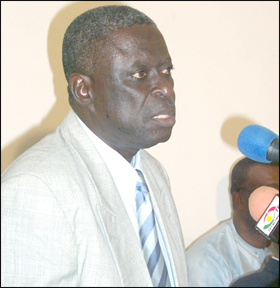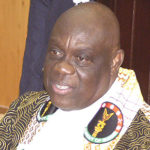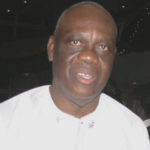A few months into the Mills presidency, one of the most powerful men within the ruling NDC has been whining about how the ruling party has “lost grounds to the opposition in the media”.
In a seven-page memo to none other than the president, Paul Victor Obeng (who was largely thought of as the unofficial ‘Prime Minister’ under the Rawlings regime) states: “The opposition seems to have taken the media war to us and dictating the agenda. The government has lost grounds to the opposition in the media and that the past government is succeeding in making our government seem unready, confused and incoherent.”
Mr. Obeng then proceeds to make some recommendations about how the government’s so-called losses can be reversed. He suggests, for example, that “the strategies designed by the media group of the NDC should be made to roll out to deal partly with the situation.” For now, it’s hard to tell what these strategies are. But Mr. Obeng offers some insights.
“We need more dedicated FM and credible and authoritative newspaper outlets within the soonest possible time,” he writes. “We may have to explore the possibility of sponsoring radio and TV programmes.”
P. V. Obeng is a powerful man. President Mills trusts him a great deal otherwise he wouldn’t have made him the chairman of the NDC’s transition team. Mr. Obeng’s words carry a lot of weight and he is among a small clique in this country who has the President’s ears 24/7.
Reading the part of his memo titled “Regaining the media ground from the enemy” should fill every Ghanaian with a great deal of trepidation. What Mr. Obeng seeks is for the government to create a situation where NDC operatives control a significant portion of the media in the hopes that this will help push the government’s agenda whiles making the government look and feel good.
The media is a vast battlefield where politicians (among several other groups and organisations) fight intensely to win the hearts and minds of the populace. Elections are won and lost on this battlefield because those who like to weigh their options before casting their ballots tend to depend on information in the media to help them make up their minds.
In Ghana, it is estimated that about 25 percent of the voting population falls within this finicky group, members of which are known as the “floating voters”. They are here today, there tomorrow and where they “float” to is often a product of what they have seen, heard or read in the media – television, radio and newspapers.
P. V. Obeng reckons that if the NDC controls the media, it will be easier for the party to avoid bad press – the sort of reportage that compels the floating voters to move to the other side. He is worried that newspapers like ‘The Statesman’ and ‘The Daily Guide’ – decidedly anti-NDC media – are setting the agenda and making the Mills administration seem quite wobbly.
“Negative press against us has been a function of the ownership of media establishments by people opposed to us and our views,” he says.
Mr. Obeng thinks that the best way to counter this is to roll out the ruling party’s media strategy, which one can only hope doesn’t involve anything more sinister than merely placing a number of media outlets in the hands of NDC sympathisers.
But he’s mistaken. What he’s suggesting (even if they include sinister plots like sh*t-bombing or imprisoning journalists on trumped-up charges) have been tried before. None of them kept any party in power forever.
First of all, it is important for P. V. Obeng – and all those who think like him – to realise that it is not the previous government which is making the Mills administration “seem unready, confused and incoherent.” It is the government’s own making. The government has made some petty mistakes it cannot wholly blame on the opposition. The un-coordinated car seizures brought back very bad memories and it was to be expected that the opposition will want to make maximum capital out of those incident. If you seize someone’s car, return it with a confession that it was a mistake and offer an apology only to turn around to mistakenly seize another car again, what do you expect your opponents to do? Clap for you?
President Mills’ actions (and inactions) have to some extent portrayed him as having been unprepared to take over the reins of government. For example, the president seems to have only started thinking about the shape and form of his governing team only after he was sworn into office and after all the dilly-dallying it turns out that a good number of his team members are going to be learning on the job. This hardly cast him in the mould of someone who is ready to govern.
Why is it that after four months in office, district chief executives are still not at post? Is this a government which is ready? If the government was so coherent why is it that when the president spoke so angrily the other time, we were all sent scrambling for what he meant? And he didn’t speak Yiddish, did he? Yet on different networks, his spokesman and communications director were interpreting his remarks differently – leaving us all scratching our heads all the more.
It is very true that the government seems “unready, confused and incoherent”. That’s pretty much the picture so far. If P. V. Obeng is looking for people to blame for this negative image, he should stop blaming “the enemy” and start looking within.
Secondly, the ruling party shouldn’t have any problem whatsoever controlling the most far-reaching media outlets in the country – the Ghana Broadcasting Corporation (they have “nationwide coverage”) and ‘The Daily Graphic’. On GBC radio and TV and in the ‘Daily Graphic’, the government of the day hardly ever does any wrong. Their editors are among the most subservient in the country – they will write and publish anything government asks them to. It has been so for ages and no one should expect this to change under the NDC.
As has been the case in the past, the president and his ministers will dominate the pages of the ‘Daily Graphic’ – and to some extent, ‘The Ghanaian Times’ – and they will have all the powers to dictate to the bosses at GBC which pictures to show and which sound bites to play.
If this isn’t enough and the government still wants to set up radio stations for its supporters to run, they are at liberty to do so – as long as the opening of new pro-NDC stations do not result in the (forced) closure of the old ones, especially those perceived to be in opposition hands.
Thirdly, P. V. Obeng and those who think like him should realise that Ghanaians are increasingly becoming very savvy with their media consumption. Even teenagers who have not attained the voting age can tell the difference between sycophantic propaganda and credible reportage and analysis.
If this was not the case, there was no chance in hell that the NDC would have won the last elections. The pro-NPP newspapers (and radio stations) gave the impression that President Mills was all but dead. But the voters preferred the ‘living-dead’ man to the seemingly healthy Nana Addo.
When the NPP went on a media blitz, splurging millions of cedis from questionable sources on billboards, full-page colour advertisements in the newspapers and lengthy radio commercials, the NDC was struggling to organise a fund-raising dinner (tickets for which remained unsold) and it seemed Nana Addo was well on his way to a resounding victory. Yet the verdict of the people went against him and his NPP.
The NDC won the election not because they controlled the media. They won because Kufuor and his gang were screwing up big time. Despite their deceitful propaganda, Ghanaians saw through the facade and voted against the NPP.
Therefore, my final point is a simple one. Instead of seeking to control media outlets, as has been suggested by P. V. Obeng, President Mills should just simply focus on delivering on his promise to “make a difference” in the life of every Ghanaian. He should get the hundreds of thousands of school children studying under trees into proper classrooms, build hospitals, make healthcare accessible to all and provide the basics we all desire – water, electricity and security.
The Mills administration should make sure that government works for the vast majority people – not just a select, privileged few. This is the best strategy for winning the hearts and the minds of the people. A government which intends to fail is the one which will seek to control the media so that it can cover up it failings with vile propaganda.
The NDC can set up 30 radio stations in every region and instruct each station to play ‘Akatamanso’ tunes from dusk to dawn with regular messages from everyone who matters in the party. They can even sponsor ‘The Loo Snatchers’ reality programme and they can also resort to ‘buying’ journalists like the NPP did to “sing” their praises. But all of these will not keep the NDC in power forever if the promises are not fulfilled and government fails to work for the people. And if they dare try any rough tactics (typical NDC ‘buga-buga’ moves) on the media… well, let’s just say that Ghanaians will start numbering their days in power much sooner than they ever imagined.


